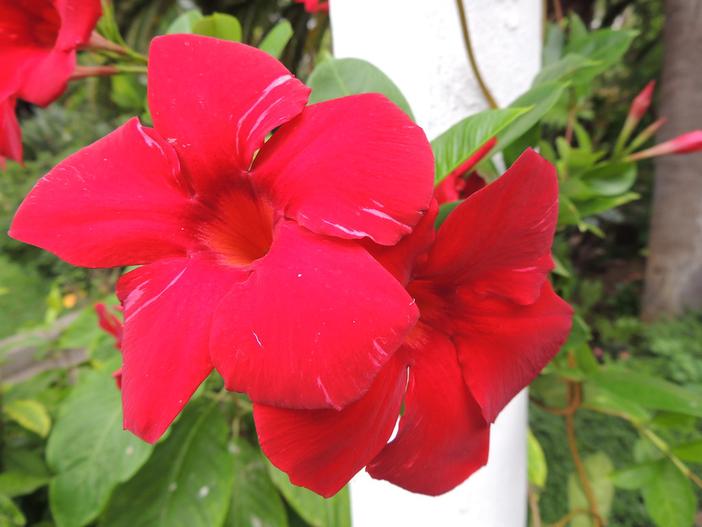Shining Mandevilla
(Mandevilla splendens)
Shining Mandevilla (Mandevilla splendens)
/
/

Cyril Nelson
PDM 1.0
Image By:
Cyril Nelson
Recorded By:
Copyright:
PDM 1.0
Copyright Notice:
Photo by: Cyril Nelson | License Type: PDM 1.0 | License URL: https://creativecommons.org/publicdomain/mark/1.0/ | Uploader: chnelsons | Publisher: Flickr



















Estimated Native Range
Summary
Mandevilla splendens, commonly known as Shining Mandevilla, is an evergreen perennial vine native to the Serra do Mar mountain range of Southeast Brazil, where it thrives in the warm, humid conditions of tropical and subtropical forests. It can reach lengths of up to 20 cm (7.9 in), with twining stems that climb on supports. The flowers are a striking rose-pink with yellow throats, blooming profusely from late spring to early summer. Each trumpet-shaped flower can be up to 10 cm (3.9 in) in length, creating a showy display. Shining Mandevilla is particularly noted for its glossy, dark green leaves which add to its ornamental value.
This vine is celebrated for its beautiful flowers and is often used in cultivation for trellises, arbors, and hanging baskets. It has earned the Royal Horticultural Society’s Award of Garden Merit, indicating its excellence for garden use. While it prefers temperatures above 5–10 °C (41–50 °F), in temperate zones it must be protected or brought indoors during winter. It requires a sheltered location with full sun exposure and benefits from medium water and well-drained soil. Although it is relatively easy to maintain, it can be susceptible to pests such as spider mites and aphids. Gardeners should also be aware that all parts of the plant are toxic if ingested.CC BY-SA 4.0
This vine is celebrated for its beautiful flowers and is often used in cultivation for trellises, arbors, and hanging baskets. It has earned the Royal Horticultural Society’s Award of Garden Merit, indicating its excellence for garden use. While it prefers temperatures above 5–10 °C (41–50 °F), in temperate zones it must be protected or brought indoors during winter. It requires a sheltered location with full sun exposure and benefits from medium water and well-drained soil. Although it is relatively easy to maintain, it can be susceptible to pests such as spider mites and aphids. Gardeners should also be aware that all parts of the plant are toxic if ingested.CC BY-SA 4.0
Plant Description
- Plant Type: Vine
- Height: 4-10 feet
- Width: 0.7-1.3 feet
- Growth Rate: Moderate
- Flower Color: Pink, Red
- Flowering Season: Summer, Fall
- Leaf Retention: Evergreen
Growth Requirements
- Sun: Full Sun
- Water: Medium
- Drainage: Medium
Common Uses
Bee Garden, Bird Garden, Butterfly Garden, Fragrant, Hummingbird Garden, Low Maintenance, Showy Flowers
Natural Habitat
Native to the warm, humid conditions of tropical and subtropical forests in the Serra do Mar mountain range of Southeast Brazil
Other Names
Common Names: Stor Bägarranka
Scientific Names: , Dipladenia splendens, Mandevilla splendens, Echites splendens, Micradenia splendens,
GBIF Accepted Name: Mandevilla splendens (Hook.fil.) Woodson